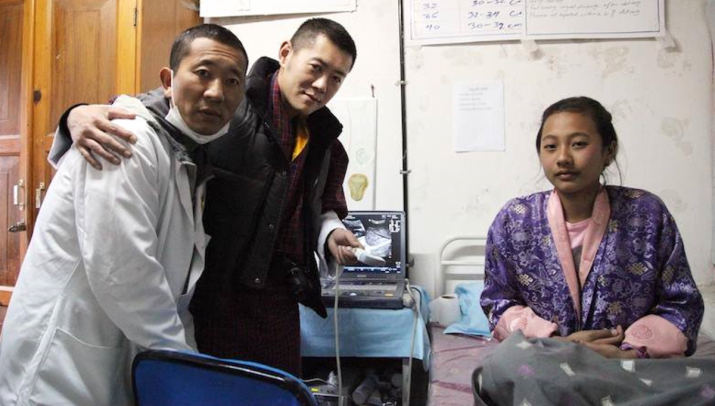
By Shyamal Sinha

Gross National Happiness (also known by the acronym: GNH) is a philosophy that guides the government of Bhutan. It includes an index which is used to measure the collective happiness and well-being of a population. Gross National Happiness is instituted as the goal of the government of Bhutan in the Constitution of Bhutan, enacted on 18 July 2008.
The term Gross National Happiness was coined in 1972 during an interview by a British journalist for the Financial Times at Bombay airport when the then king of Bhutan, Jigme Singye Wangchuck, said “Gross National Happiness is more important than Gross National Product.
Despite recently taking office as the new prime minister of Bhutan, 51-year-old Lotay Tshering, president of Druk Nyamrup Tshogpa (the Bhutan United Party), has found a measure of social media fame as he still finds time to put his medical training to good use, attending surgery and seeing patients on Saturday mornings and undertaking academic rounds with trainee medical staff and new doctors every Thursday morning.
Tshering, a trained urologist, was sworn in as prime minister of the Himalayan kingdom in November last year, but his reluctance to completely give up treating patients has seen pictures of him at Jigme Dorji Wangchuck National Referral Hospital (JDWNRH) in the capital Thimphu shared widely on social media to an enthusiastic reception among Bhutanese Facebook users.
“I won’t leave my practice for anything. All that I am today is because of that, even becoming a prime minister. Therefore, even today I see patients and conduct surgeries every Thursday and Saturday morning,” Tshering is quoted as saying on Facebook. “I was not born a doctor, but I will die as one.”
Born in 1968, Tshering graduated with an MBBS degree from Mymensingh Medical College under Dhaka University in Bangladesh in 2001. He studied urology at the Medical College of Wisconsin in 2007, becoming the only practicing trained urologist in Bhutan. Tshering obtained a fellowship in endourology at Singapore General Hospital, and Okayama University, Japan in 201, and in 2014 he received an MBA from the University of Canberra, Australia.
Sandwiched between economic heavy-hitters China and India on the edge of the mighty Himalayan mountain range, the tiny Buddhist Kingdom of Bhutan is perhaps best known for prioritizing “Gross National Happiness” over the shortsighted acquisitiveness of development based solely on economic growth, and for its sustainable approach to environmental stewardship.
The philosophy of GNH was introduced in the late 1970s by the country’s fourth king, Jigme Singye Wangchuk, drawing inspiration from the kingdom’s traditional Buddhist culture. An alternative to traditional metrics for measuring national development, such as gross national product (GNP) or gross domestic product (GDP), GNH is founded on four underlying principles or “pillars:” good governance, sustainable socio-economic development, the preservation and promotion of culture, and environmental conservation.
Prioritizing Gross National Happiness also extends to healthcare, with affordable and accessible medical treatment central to the nation’s public policy. The country’s constitution notes that: “The state shall provide free access to basic public health services in both modern and traditional medicines.” Healthcare infrastructure and services are developed through five-year plans by the Ministry of Health, which has provided universal healthcare since the 1970s.
The kingdom is also unique in being the world’s only remaining Vajrayana Buddhist nation. The spiritual tradition is embedded in the very consciousness and culture of this remote land, where it has flourished with an unbroken history that dates back to its introduction from Tibet in the eighth century by the Indian Buddhist master Padmasambhava, also known as Guru Rinpoche.
Most Bhutanese—about 75 per cent of the population of some 735,000 people—identify as Buddhists, according to data for 2010 from the Washington, DC-based Pew Research Center, with Hinduism accounting for the majority of the remainder. Most of Bhutan’s Buddhists follow either the Drukpa Kagyu or the Nyingma school of Vajrayana Buddhism.
In 2011, The UN General Assembly passed Resolution “Happiness: towards a holistic approach to development” urging member nations to follow the example of Bhutan and measure happiness and well-being and calling happiness a “fundamental human goal.











